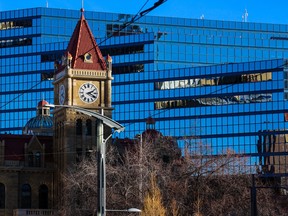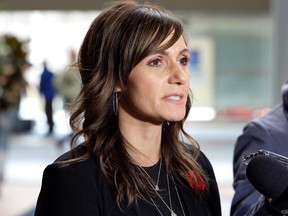The $237.7-million surplus resulted from higher revenues, lower than expected expenditures and a favourable variance across several tax-supported services

Article content
Crediting “higher-than-expected investment income and supplementary revenue,” the City of Calgary posted a $238-million surplus in 2023, according to a report presented at Tuesday’s executive committee meeting.
Chief financial officer Carla Male presented the city’s 2023 progress update to councillors.
Article content
She said the $237.7-million surplus resulted from higher revenues, lower than expected expenditures and a favourable variance across several tax-supported services.
Advertisement 2
Article content
“In 2023, we worked hard to deliver results and make life better for Calgarians,” Male said.
Operating surpluses are common for Canadian municipalities that strive for a balanced budget, she said. The most recent in Calgary follows a $259-million surplus in 2022.
“They normally arise because of factors and events that occurred differently than assumed in the budget plan, including budgeted contingencies for unforeseen circumstances that may or may not materialize, or other circumstances the city has limited or no ability to control,” she said.
The operating variance represents 5.2 per cent of the budgeted total expenditures net of recoveries, according to the report.
Broken down, the report indicates a $164-million corporate programs variance, which can be attributed to collecting $68.6 million more in revenues than was budgeted for, and a $73.7-million tax-supported variance that resulted “from higher revenues, lower salaries and wages, and several one-off impacts.”
Male noted council voted during the November budget deliberations to allocate $100 million of the anticipated surplus from 2023 to support high-priority investments, including projects related to housing, public safety and transit.
Article content
Advertisement 3
Article content
The remaining $137.7 million will be transferred to the fiscal stability reserve, Male said, upon council’s approval.
Recommended from Editorial
Local access fees
The city also collected $200 million more from local access fees than was budgeted for in 2023, largely due to volatile price swings that drastically drove up the cost of electricity last year.
Council committed $165 million from the city’s local access fee surplus to fund capital investments, according to Male.
The remaining $35 million from the franchise fee surplus will be transferred to the fiscal stability reserve, as will surplus revenue from the Enmax dividend.
Capital expenditures
The report highlights that in 2023, the city spent $1.5 billion on capital investments, or 52.5 per cent of the $2.8-billion budget, up from 44.4 per cent in 2022.
Some of the key expenditures Male referenced Tuesday included the Vivo expansion, renovations to Glenmore Athletic Park, resurfacing of the Foothills Athletic Park track and completion of Haskayne Legacy Park.
Advertisement 4
Article content
Other ongoing capital priorities cited in the report include the downtown event centre, the Rundle Redevelopment Project for Affordable Housing, and downtown revitalization efforts including the Arts Commons and Olympic Plaza transformation projects.
She said the city’s capital expenditures continue to be affected by cost escalations, supply disruptions and other “systemic contributing factors.”
She said an unspent budget of $1.3 billion from 2023 will be carried forward to 2024.
‘This was not a one-off that has never happened’
Ward 1 Coun. Sonya Sharp has argued the city shouldn’t need to resort to raising taxes substantially when simultaneously posting large operating variances.
She reiterated that position after Tuesday’s meeting, saying that while a surplus is preferable to a deficit, true fiscal responsibility comes with balancing the budget.
“If we see surpluses like this almost every year, we need to re-evaluate the level of risk we’re willing to tolerate there,” she said. “Are we actually being realistic about how we anticipate these surpluses? This was not a one-off that has never happened. We’re seeing continuous surpluses.”

Sharp noted this year’s surplus can’t be used to offset taxes for 2025 because it would create a bow wave effect, but “we need to start putting administration in a position that we could use this money.”
She pointed out that council recently decided to change how the city collects local access fees, altering the formula to ensure more stable and predictable revenues from the fee will be collected in the future.
However, she acknowledged that change won’t come into effect until 2027.
Article content





